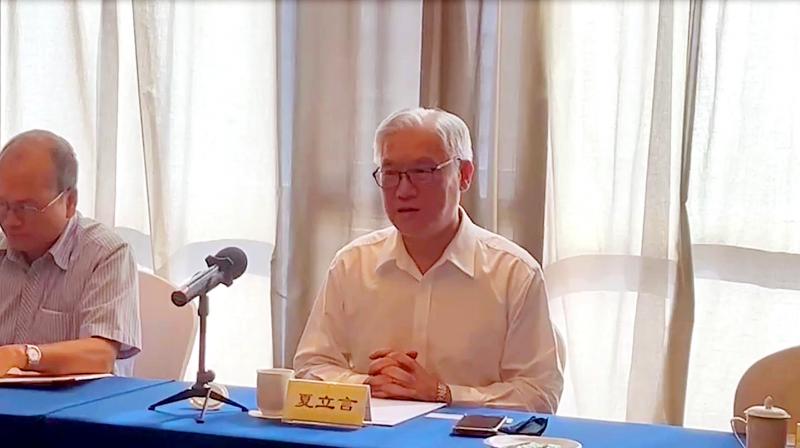A delegation to China led by Chinese Nationalist Party (KMT) Vice Chairman Andrew Hsia (夏立言) sparked controversy over the weekend amid speculation that they might meet with top Chinese officials today.
It is rumored that the delegation has a “hidden itinerary,” which includes meeting Taiwan Affairs Office Minister Liu Jieyi (劉結一) and Association for Relations Across the Taiwan Straits Chairman Zhang Zhijun (張志軍).
The KMT has said that the group would not meet with top Chinese officials or discuss political issues during the visit.

Photo provided by the KMT
KMT Chairman Eric Chu (朱立倫) yesterday said that the goal of the visit is to solve problems related to Taiwanese businesspeople, adding that he has not heard about a hidden itinerary.
The KMT mentioned to the Mainland Affairs Council (MAC) before the trip that the group might meet with Liu and other officials, but did not specify a time or place, said a government official who asked to remain anonymous.
The MAC had tried dissuading the KMT delegation from visiting China amid Beijing’s military exercises around Taiwan and economic sanctions against the nation, the official added.
Hsia’s delegation arrived in China on Aug. 10, with some KMT members calling the timing of the visit improper, as it came shortly after China on Aug. 4 began live-fire drills in waters around Taiwan. The military exercises were in response US House of Representatives Speaker Nancy Pelosi’s Aug. 2 to 3 visit to Taipei.
The KMT Culture and Communications Committee yesterday said in a statement that the delegation on Saturday completed their 10-day COVID-19 quarantine.
That night, the group dined with Xiamen officials and Xiamen Taiwanese Businessmen Association chairman Wu Chia-ying (吳家瑩), it said, adding that they held a forum to share ideas with Taiwanese businesspeople yesterday.
The statement said that Hsia had asked Xiamen officials to reopen the “small three links” to allow people-to-people exchanges across the Taiwan Strait, which were suspended in February 2020 due to the COVID-19 pandemic.
The “small three links” are the ferry services connecting China’s Fujian Province with Penghu, Kinmen and Lienchiang counties.
The trip was planned because some Taiwanese businesspeople hoped to meet KMT members, as they had not visited China for years, Hsia said.
KMT Taipei mayoral candidate Chiang Wan-an (蔣萬安) yesterday urged Hsia to clearly state his stance against China’s drills and make the itinerary transparent.
Additional reporting by Tsai Si-pei

SECURITY: As China is ‘reshaping’ Hong Kong’s population, Taiwan must raise the eligibility threshold for applications from Hong Kongers, Chiu Chui-cheng said When Hong Kong and Macau citizens apply for residency in Taiwan, it would be under a new category that includes a “national security observation period,” Mainland Affairs Council (MAC) Minister Chiu Chui-cheng (邱垂正) said yesterday. President William Lai (賴清德) on March 13 announced 17 strategies to counter China’s aggression toward Taiwan, including incorporating national security considerations into the review process for residency applications from Hong Kong and Macau citizens. The situation in Hong Kong is constantly changing, Chiu said to media yesterday on the sidelines of the Taipei Technology Run hosted by the Taipei Neihu Technology Park Development Association. With

CARROT AND STICK: While unrelenting in its military threats, China attracted nearly 40,000 Taiwanese to over 400 business events last year Nearly 40,000 Taiwanese last year joined industry events in China, such as conferences and trade fairs, supported by the Chinese government, a study showed yesterday, as Beijing ramps up a charm offensive toward Taipei alongside military pressure. China has long taken a carrot-and-stick approach to Taiwan, threatening it with the prospect of military action while reaching out to those it believes are amenable to Beijing’s point of view. Taiwanese security officials are wary of what they see as Beijing’s influence campaigns to sway public opinion after Taipei and Beijing gradually resumed travel links halted by the COVID-19 pandemic, but the scale of

A US Marine Corps regiment equipped with Naval Strike Missiles (NSM) is set to participate in the upcoming Balikatan 25 exercise in the Luzon Strait, marking the system’s first-ever deployment in the Philippines. US and Philippine officials have separately confirmed that the Navy Marine Expeditionary Ship Interdiction System (NMESIS) — the mobile launch platform for the Naval Strike Missile — would take part in the joint exercise. The missiles are being deployed to “a strategic first island chain chokepoint” in the waters between Taiwan proper and the Philippines, US-based Naval News reported. “The Luzon Strait and Bashi Channel represent a critical access

Pope Francis is be laid to rest on Saturday after lying in state for three days in St Peter’s Basilica, where the faithful are expected to flock to pay their respects to history’s first Latin American pontiff. The cardinals met yesterday in the Vatican’s synod hall to chart the next steps before a conclave begins to choose Francis’ successor, as condolences poured in from around the world. According to current norms, the conclave must begin between May 5 and 10. The cardinals set the funeral for Saturday at 10am in St Peter’s Square, to be celebrated by the dean of the College